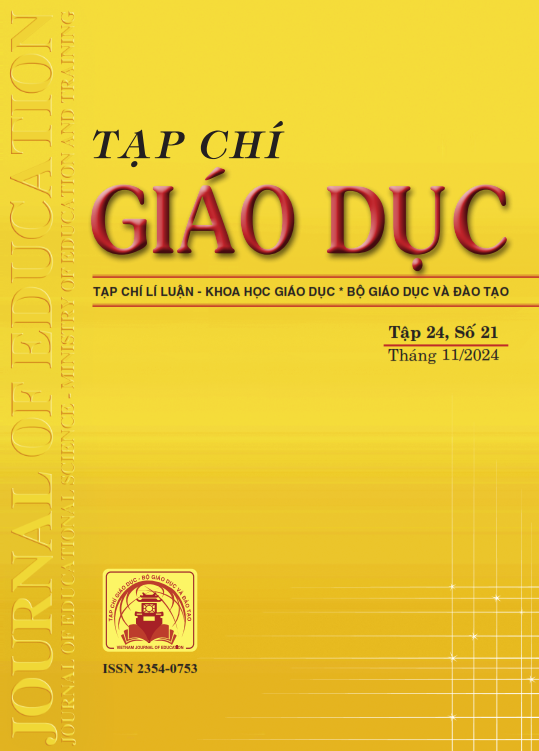Nhận diện văn hóa học tập của học sinh ở các trường trung học phổ thông Thành phố Hồ Chí Minh trong bối cảnh thực hiện Chương trình giáo dục phổ thông 2018
Tóm tắt
School culture is a decisive factor and bears great significance to the success of a school, helping affirm, preserve, and spread its value system. The learning culture of students is one of the key components of the overall school culture. The 2018 General Education Curriculum, issued under Circular 32/2018/TT-BGDĐT, is a testament to educational reform in Vietnam, aimed at fostering the comprehensive development of students not only in academic capacities and attitudes toward learning but also in their social skills. This paper aims to assess the current state of students’ learning culture in public high schools in Ho Chi Minh City within the context of educational reform. A survey of 771 managers, teachers, staff, and 1,499 11th-grade students from 13 public high schools in Ho Chi Minh City revealed that students' learning culture is not highly rated, being the lowest among the cultural factors constituting school culture. In particular, students' academic competence was identified as the strongest aspect. However, social skills, attitudes toward learning, and learning purposes and motivation received mixed feedback, indicating areas that require further improvement.
Tài liệu tham khảo
Bộ GD-ĐT (2018). Chương trình giáo dục phổ thông - Chương trình tổng thể (ban hành kèm theo Thông tư số 32/2018/TT-BGDĐT ngày 26/12/2018 của Bộ trưởng Bộ GD-ĐT).
Cooper, M. (1988). Whose culture is it, anyway? In A.Lieberman (ed). Building a professional culture in schools. New York: Teachers College Press.
Đặng Thành Hưng (2016). Văn hóa tổ chức và văn hóa nhà trường trong quản lí giáo dục. Tạp chí Khoa học giáo dục, 124, 10-12.
Deal, T., & Kennedy, A. (1983). Culture and school performance. Educ. Leadersh, 40, 14-15.
Hargreaves, D. (1999). Helping practitioners explore their school’s culture. In, J. Prosser, School Culture (London: P.C.P.), 48-65. http://dx.doi.org/10.4135/9781446219362.n4
Helsper, W. (2000). Wandel der Schulkultur. Zeitschrift für Erziehungswissenschaft, 3(1), 35-60.
Hopkins, D. (2001). School Improvement for Real. London: Falmer Press.
Maslowski, E. R. (2001). School Culture and School Performance. Ph.D. thesis, University of Twente.
Maslowski, R. (1997). Schoolcultuur: kenmerken en veranderingsmogelijkheden [School culture: characteristics and levers for change]. In: B.P.M. Creemers e.a. (Eds.), Handboek Schoolorganisatie en Onderwijsmanagement (pp. B1400/1-B1400/25). Alphen aan den Rijn: Samsom Tjeenk Willink. https://culturalrights.net/
Miner, J. B. (1995). Administration and Management Theory. Brookfield, VT: Ashgate.
Nguyễn Minh (2007). Bàn về văn hóa học đường Việt nhà trường phổ thông. Đề tài cấp Bộ, mã số: B2008-37.
Nguyễn Sỹ Thư, Dư Thống Nhất, Nguyễn Thị Tú (2024). Giáo dục và quản lí giáo dục trong kỉ nguyên số. NXB Đại học Sư phạm Thành phố Hồ Chí Minh.
Nguyễn Toàn Thắng (2021). Những vấn đề chung về văn hóa học đường trong bối cảnh đổi mới giáo dục và đào tạo. Kỉ yếu Hội thảo “Văn hóa học đường trong bối cảnh đổi mới giáo dục và đào tạo”. NXB Giáo dục Việt Nam.
Phillips, G. (1996). Classroom rituals for at-risk learners. British Columbia School Trustees Publishing.
Schein, E. H. (2004). Culture: the missing concept in organization studies. Administrative Science Quarterly, 41, 229-240.
Schoen, L., & Teddlie, C. (2008). A new model of school culture: a response to a call for conceptual clarity. Schl. Effect. Schl. Improv, 19, 129-153. http://dx.doi.org/10.1080/09243450802095278
Stoll, L., & Fink, D. (2000). Changing our Schools. Zagreb: Educa.
Thái Văn Thành (2021). Xây dựng văn hóa học đường trong bối cảnh đổi mới giáo dục và đào tạo. Kỉ yếu Hội thảo “Văn hóa học đường trong bối cảnh đổi mới giáo dục và đào tạo”. NXB Giáo dục Việt Nam.
Vujiciˇ c, L. (2008). The culture of the educational institution and the quality of changes in the educational practice. Pedagogical Research, 5, 7-20.
Tải xuống
Đã Xuất bản
Cách trích dẫn
Số
Chuyên mục
Giấy phép

Tác phẩm này được cấp phép theo Ghi nhận tác giả của Creative Commons Giấy phép quốc tế 4.0 .












